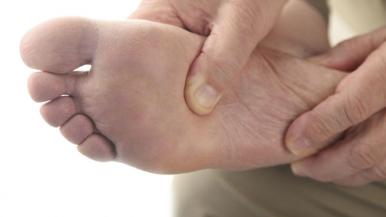A simple blister on your heel doesn’t sound like a big deal, does it? But for someone with diabetic neuropathy, the nerve damage that affects 60 to 70% of those who have diabetes, such a seemingly small problem can become a catastrophe.
As the number of Americans diagnosed with diabetes has skyrocketed — more than tripling between 1980 and 2011, to 20.9 million — so has the number of people coping with neuropathy.
The thinking is that elevated blood sugar causes damage not only to nerves, but also to the blood vessels that supply those nerves. The resulting numbness, pain and systemic issues can lead to serious health complications.
"The good news is that you can prevent diabetic neuropathy or slow its progression by keeping your blood sugars under tight control," says Rabia Malik, MD, a neurologist at Rush. "Aside from medications, this can be achieved by a combination of diet modification and exercise to maintain a healthy weight."
Signs and symptoms
Diabetic neuropathy can damage nerves throughout the body, including sensory nerves that transmit sensations such as touch, temperature and pain; motor nerves that control movement; and autonomic nerves that control involuntary processes such as heart rate, blood pressure and digestion.
Signs of diabetic neuropathy include the following:
- Numbness, burning or tingling in hands and/or feet. Numbness in the feet, the most common symptom of diabetic neuropathy, is also potentially one of the most dangerous.“Sensory loss in the feet may lead to ulcers that go unnoticed and can subsequently lead to tissue death and bone infections," Malik says. In very severe cases, amputation may be required.
- A diminished sense of balance, which can lead to serious falls.
- Digestive, urinary and genital issues such as nausea, constipation or diarrhea, frequent bladder infections and sexual dysfunction (e.g., erectile problems or vaginal dryness).
Malik points out that it’s important to have a thorough medical workup if you think you’re experiencing neuropathy, since even in diabetic patients neuropathy might be caused by other issues such as nutritional deficiencies, autoimmune disorders or a tumor that’s causing pressure on a nerve.
A neurologist will typically do a thorough physical examination and order blood tests to exclude other causes of neuropathies that may mimic diabetic neuropathies. An electromyogram may be performed to objectively test the function of the nerves and the muscles.
Sensory loss in the feet may lead to ulcers that go unnoticed and can subsequently lead to tissue death and bone infections.
Prevention and treatment
Diabetic neuropathy is irreversible once it has begun, so prevention is crucial. That often means getting blood sugar under control even before a diabetes diagnosis.
"Borderline diabetics are at risk of developing nerve damage as well," Malik says. "In fact, in some people the symptoms of neuropathy may be the first sign of diabetes."
For those already diagnosed, maintaining tight control of blood sugar (at a daily level around 100 mg/dL) is critical to slowing neuropathy’s progression: Neuropathy generally appears after blood sugar has been poorly controlled for some time and worsens when levels remain too high.
Malik and her fellow neurologists use a number of strategies — sometimes in combination — to help patients manage diabetic neuropathy:
- Physical therapy to strengthen core muscles and improve coordination.
- For painful neuropathies, heat, massage, analgesics and transcutaneous electrical nerve stimulation (TENS), in which an electric current is used to modulate nerves’ signals to the brain
- Topical local medications such as lidocaine gel or patches that numb pain
- Anticonvulsants or antidepressants to block pain signals from the central nervous system
- Alternative therapies such as biofeedback and acupuncture
Diabetic patients should also check their feet everyday, and wear shoes that fit well, have appropriate support and cushioning to protect their feet.
But by far the most powerful way to address diabetic neuropathy is to improve overall health, control blood sugar and have a thorough understanding of the consequences of uncontrolled diabetes.




